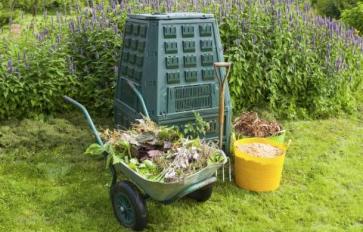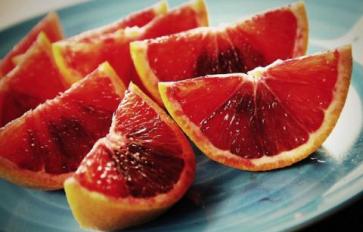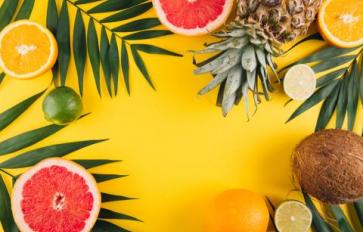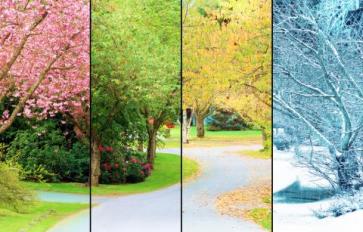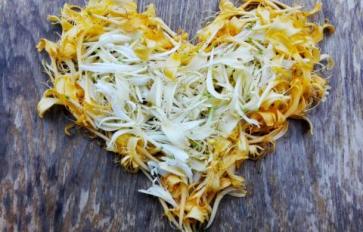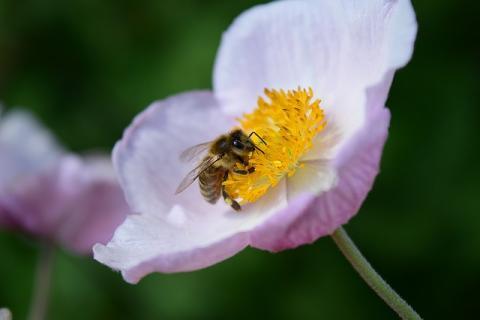
Due to the recent Zika spraying, massive use of neonicotinoid pesticides, and other environmental factors, bees are now on the endangered species list, effective October 31, 2016. If bees go extinct, honey won't be the only thing we'll be missing: A third of the food humans eat would disappear with the bees. To put things in perspective, that means no more blueberries, apples, pumpkins, or almonds – all those plants (among others) need bees. Worried yet? Here's what you can do to make sure these important pollinators stick around.
Plant bee-friendly flowers
Due to monoculture based food farming (or farms that consist of one crop year after year on the same land), bees are losing their habitats. The reason is simple: No flowers. If land is flower barren, bees can't collect nectar and wind up starving. This problem even exists in suburban areas: Way too many people insist on having the most pristine lawn and dub any naturally occurring flowers (such as dandelions and clovers) as weeds. This makes food harder to come by for bees, which means they have to travel farther from their hive (another exhausting act). To help prevent this, why not try planting some flowers that will make your lawn look beautiful and bee friendly (instead of unkempt)? Since it's fall, you can give fuchsia, mint, bush sunflower, sage, verbena, and toadflax a try. We’ve written more extensively on planting native plants here. The coolest part is that you can also harvest the mint and sage as it continues to grow for your own use, whether it be in the kitchen or DIY crafts. In the spring, you can switch up your yard with different flowers like lilacs, penstemon, lavender, sage, verbena, and wisteria. In the summer, you have even more options, such as cosmos, sunflowers, poppies, black-eyed Susans, passion flower vine, or honeysuckle. Just remember to avoid any chemicals and try sticking to organic seed mixes – this will ensure the quality of your plants. Your beautiful lawn will always be the talk of the town (and not just amongst the bees)! To read more about how to make your yard a habitat for pollinators, visit us here and here.
Buy local raw honey
Believe it or not, your honey may be infested with chemicals. That's because not all beekeepers treat their bees the same: In some cases, hives are sprayed with chemicals as part of the honey harvesting process. This can not only harm the bees, but it can also harm you! Moreover, many sellers will sell honey that isn’t actually real honey at all! To avoid this, try buying local raw honey whenever possible. Go to your farmer’s market and meet the local beekeepers. You can strike up a conversation and learn about their honey harvesting process from the source. Plus, raw honey is loaded with the most health benefits and taste. That's because raw honey still has bee pollen and bee propolis in it, which are both loaded with anti-inflammatory properties, vitamins, and minerals. Raw honey can come in various colors, depending on the type of flower the nectar came from (this affects taste, too, by the way). Try to avoid buying honey that’s been shipped from China because there have been multiple cases of honey being chemically contaminated from China. No matter if you decide to buy from a farmer’s market or the grocery store, really read the labels on the honey and look for words like local, raw, and organic. This will guarantee you get the best honey for both you and the environment.
Avoid using chemicals/pesticides on lawns and gardens
Don't use chemicals or pesticides. Ever. They will not only harm the pests you're trying to keep at bay, but also bees, plants, and eventually yourself! When a flower or plant is sprayed with a pesticide, it's absorbed into it whether you know it or not. In the case of flowers, this pesticide gets absorbed into their nectar. Bees then ingest this contaminated nectar and take it back to the hive, creating pesticide filled honey. Not only is this bad for the bees’ ecosystem, it's also dangerous to us! Would you like to ingest some neo-nicotinoid with that honey? Yeah, thought not. Thankfully, you can always make your own organic pesticides that will cost you way less than the harmful ones (here are some to get you started). Your garden will thank you.
Buy from farmer’s markets
Don't just buy honey at the farmer’s market, buy produce! Not only will you save a buck or two, you'll also be making an ecological choice. That's because when you purchase from a farmer you know, you avoid endorsing monoculture-based farming (which is a huge cause of bee habitat loss, as I mentioned earlier). Plus, you can always ask them about their farming procedures if you want to double check they don't use pesticides. Always aim to purchase from farmers that grow certified organic produce, but be aware that the USDA Organic Certification can be expensive. Just because a farmer or beekeeper doesn't have the USDA seal does not necessarily mean their produce isn't worth eating. Most of the time they aren't USDA certified simply because they don't produce a high quantity or cannot afford to be certified because they're a small business. Don't let this stop you from buying their produce: Just make sure to have a friendly conversation with them about their products to make sure they live up to the best possible standards.
Realize bees aren't out to sting you
I must admit, this is a hard one for me to live by. Every time I see a bee, I'm the worst at keeping my cool, unless I know without a shadow of a doubt it's just a honeybee. But here's the thing: Bees aren't out to get you. Did you know they're actually vegetarians? They can also sense fear because they are able to smell the pheromones we produce that occur naturally in us when we're angry or afraid. Instead of screaming and running around like a looney (ahem, aka me), do your best to remain calm and let them sniff you out. They won't bother you unless they feel threatened, or if you're blocking their hive. Bees are very territorial and need constant access in and out of their hives in order to keep operations in check. The same goes for flowers: Don't block bees from accessing them either. Doing so will only aggravate them and could compel them to sting you. However, honeybees die after stinging people, while wasps do not (so it's good to know the difference). Remember: Wasps are also carnivores, so they're the ones who show up to your barbeques, not honeybees. So the next time you think a bee wants a bite of your chicken sandwich, remember that it is too busy pollinating your garden to care.


